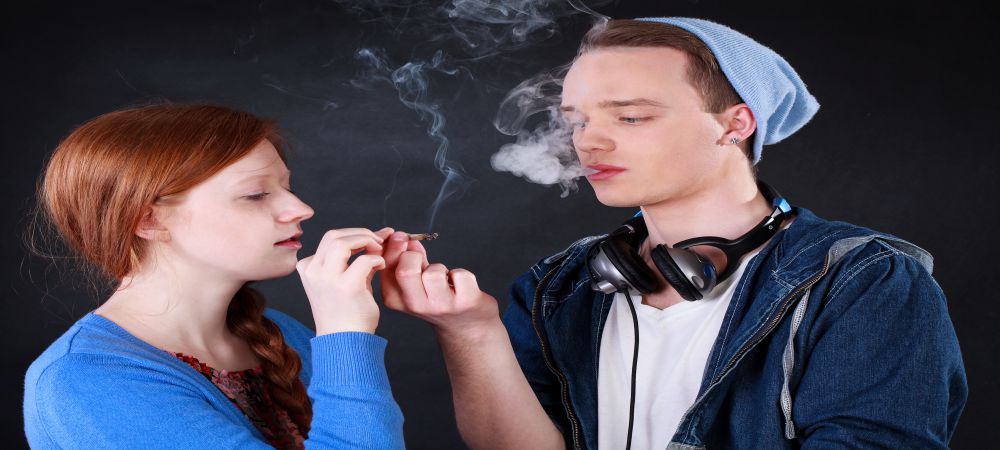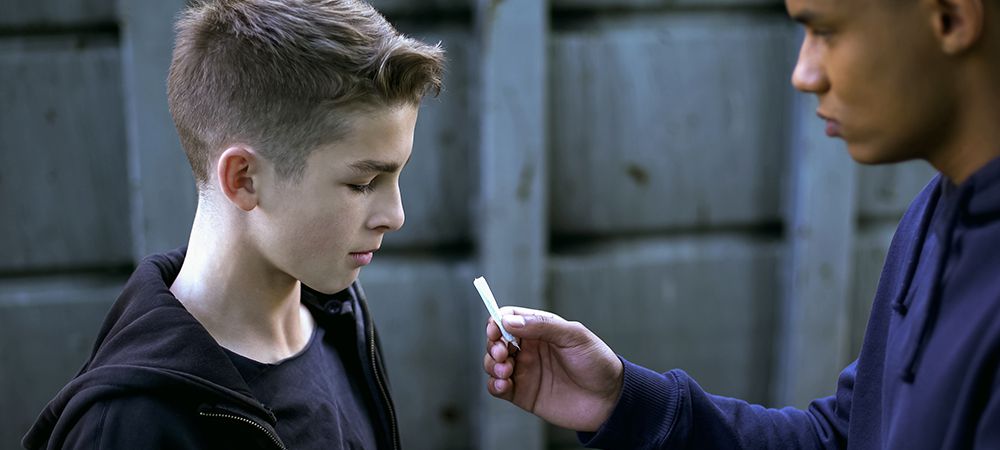Although, it may seem like an uncomfortable prospect, you must talk to teenagers about marijuana use. You aren’t protecting them by keeping them in the dark. In today’s world, it’s impossible to keep teenagers in the dark about topics like this.
They have access to the internet. Or they may have friends or classmates that indulge in marijuana. Hence, the way to protect your teenagers is not by avoiding any mention of it. Instead, you need to get them to understand your position about marijuana use.
Initiating and engaging in this talk is easier said than done. Not only is it difficult to bring up, but it’s also sensitive. If you don’t do a good job, it may backfire.
You shouldn’t feel any pressure, as there is no perfect foolproof way to do it. In the end, it all depends on the kind of relationship you have with your teenager.
To avoid the conversation taking a wrong turn, we’ll provide you with general information that can help you get talking to teens about marijuana. This way, you can come up with a strategy that makes it easy for you to have this talk.
Marijuana Use Among Teenagers
According to an NCBI report, about 28% of the teen population that uses marijuana are Canadians. Since the legalization of marijuana in Canada in 2018, its use has been on the rise.
This is very worrying, as addiction and ultimately fatal issues result from the continuous abuse of marijuana. In light of that, you must talk to teenagers about marijuana use. It can end up being a vital step that stops your ward from falling into addiction.
There are different ways teenagers consume marijuana. The most common mode of consumption is smoking. Marijuana can also be consumed as an edible. As the years roll by, the concentration of marijuana strain per volume has increased astronomically. Hence, the efficacy of today’s marijuana supersedes that of the same strain a few years ago.
Marijuana has medical applications. However, this does not apply to teenagers. If for anything, the use of marijuana is detrimental to the health of teenagers. With teenage marijuana addiction, there is a cause for worry.
What’s more worrying is that the stigma that caused refrain for many persons in the early 2000s is no longer there. With the legalization of the substance, the moral acceptability of marijuana consumption is on the rise.
Before you talk to your teenage children about marijuana, it’s important to understand why they may want to use it in the first place. Two major factors lead to teenage marijuana abuse.
Peer Pressure
When children live in a family where there is a smoker, the risk of picking up the behaviour is high. Friends are also a major influence on whether your teenager smokes weed or not. If they have friends who do, thanks to the curiosity and the exploratory disposition of teens, they may try marijuana out.
Recent trends show that high school students are more likely to do without marijuana use. However, when teens progress towards college, they are more likely to start smoking marijuana. This is one reason why you should talk to teenagers about marijuana use.

Self-medication and psychological escape
Depression is a common mental health problem among teenagers. Worse, it can lead to marijuana abuse. According to an NBC News report, about 7% of depression is linked to marijuana use.
As a solace from depression, teens resort to this illicit drug to get ‘high’ and active. The repetition of this activity leads to addiction in no time. This “self-medication”, rather than getting expert help, is dangerous and a leading cause of cannabis addiction.
The issue that causes the use of marijuana doesn’t have to be depression. Sometimes, anxiety, abuse and other mental health problems can also cause it. This is one major reason why you need to master how to talk to teenagers about marijuana abuse.
Related Article: Top Reasons Young People Use Marijuana
Risks of Marijuana Use for Teenagers
If you don’t talk to teenagers about marijuana use, you may soon be getting more than what you bargained for. The risks of consistent marijuana abuse among teenagers are enormous. Unlimited marijuana use can result in terrible mental and behavioural conditions.
Thanks to the legalization movement in Canada, most teenagers now think marijuana is safe. This miscommunication can be damning if care is not taken. It should be said that legal marijuana use in Canada is not for those under 19. However, teens younger than this still use marijuana — without much reproach.
As a guardian or parent, dealing with a child that uses marijuana involves you effectively communicating the risks to them. Helping them understand the following risks is vital.
Reduced retention-ability
Teenage years should be full of active learning. The use of marijuana distorts the learning process for teenagers. With consistent marijuana use, the average teenager will find it difficult to be retentive.
Learning, generally, becomes arduous. You’ll notice this in their grades and results. They’ll fall below their usual standards and may find it hard to recover. This can ultimately go on to negatively impact their life career choices.
Addiction
Addiction is terrible, especially for teens. Hence, you should do everything possible to talk to teenagers about marijuana use.
After marijuana use, its psychoactive influence kicks in, releasing dopamine in the brain. This gets the user happy, active, and very aware.
This is what lures most users. However, after a while, this effect wanes. To achieve the feeling again, you’ll have to use the substance again.
In no time, addiction comes knocking. Your teenage children begin to need more of the substance to reach the same levels of high.
This is because the brain builds tolerance with constant use. Getting to this level of marijuana addiction may take a while. However, marijuana dependence and addiction occur faster in teens.
Poor life quality
Once addiction kicks in, quality of life takes a persistent nosedive. The plummeting quality of life gets worse as your teen starts to make all the wrong decisions.
This may lead to depression. And in a bid to escape the depression, they may use more of the substance. As such, the vicious cycle continues.
For teens, poor life quality may mean they start to lose good friends. Or, they may start to lose direction in life and exhibit rebellious behaviour. At this point, it’s best to take the bold step of working with marijuana rehab services to reverse this issue.
Mental Illness
This reality is sad, especially for teens. Consistent marijuana abuse has the probability of resulting in panic attacks. It can also come with conditions like hallucinations, disoriented thoughts and paranoia. None of these are good news.
Accidents
The number of Canadians that suffer auto-crashes due to drugs is skyrocketing. Teens are a larger part of this demographic. For teens, or anybody else for that matter, the influence of marijuana results in a lack of proper judgment. Coordination gets poorer and your alertness douses.
You become incapable of driving safely — an activity that requires you to have swift reactions. Teens are dying on the road under the influence of marijuana. Hence, it is time to talk to teenagers about marijuana use.
Signs Your Teen is Using Marijuana
It’s very easy to dismiss the signs of marijuana use and addiction as teenage tantrums. Many of the signs of addiction bear somewhat of a resemblance to that of puberty. Hence, you need to be extra careful and vigilant. Here are signs to tip you off if your teen smokes or eat weed:
Loss of interest
They begin to lose interest in things they normally hold dear. For instance, they may suddenly lose interest in the family Friday night movies.
It’s easy to mistake this as your teenage children growing up. However, the loss of interest may also be due to marijuana addiction.

Bad grades
Bad grades suddenly begin to surface in their results. When you confront them with this plummet, they’ll probably refuse to talk about it. You’ll probably notice your teen being lackadaisical about the drop in grades.
They change or lose friends
Teenagers are arguably the most social age group. They make friends easily. In the neighbourhood, your teen probably has numerous friends.
When you notice these friendships are changing, you should sit up and take notice. Teenagers who use marijuana will likely crave solitude. They’ll want to be alone as much as possible. This way, they can indulge in peace. As a result, they’ll spend less time with friends and family.
They stink of marijuana
To know what’s up with your teens, you may need to find out what marijuana smells like. Teens addicted to marijuana will surely have the scent hanging around them.
Change in personality
This is the most radical and easily noticeable of changes. Is your teen someone that was always happy and jovial, but is now dull and moody? Something may be wrong. Typically, teenage marijuana users and addicts experience a change in personality, appearance, and mood.
Tips to Talk to a Teenager about Weed (Marijuana)
Teens are arguably the most sensitive age groups to deal with as adults. They can easily snap at you, and storm out of the room. Or they can decide to clam up and venture no useful information. Hence, due to how delicate their age group is, knowing how to properly talk to teenagers about marijuana use is vital.
You should know there is no singular best way to go about this talk. As a parent, guardian, friend, or family member, you must know who you are dealing with. It helps to know and understand the peculiarity of the teen in question.
Most times, teens won’t admit they indulge in marijuana. This is understandable. The fear of getting punished won’t make them admit it. But if you are adequately armed with knowledge of marijuana usage indicators, you’ll know.
Once you cross the stage of knowing, here are tips to talk to a teenager about weed.
Don’t scare them off
A mistake most parents make when looking to converse with their ward is starting with “we need to talk.” This may seem harmless to you as a parent or guardian.
However, no child likes or wants to ‘talk.’ It’s a red flag they run away from. Hence, you need to be adept in the art of getting their attention, without asking for their attention.
Be as subtle as possible
When trying to talk to teenagers about marijuana use, whether they indulge or not, you need to be subtle. Going hard on them will get you nowhere. You need your teenage child to be as vulnerable and as honest as they can be.
Remember, talking to them can either make or mar the situation. For a teen that doesn’t use the substance, they may get curious after your ‘talk’ and try it out. It’s a dicey situation you must handle expertly.
Make sure it’s the right time
There is no rush to talk about marijuana. Even if you’ve confirmed your teens’ addiction, don’t rush things. Recovery is often a long-term journey.
You need to make sure the time is right. If the teen is high, wait till they are sober. If angry, wait till smiles return to their faces. Most of the time, your teenage child’s mood can affect how smoothly your talk about marijuana abuse goes.
Don’t be judgmental
The last thing you want to be during this talk is a judge. No one likes to be judged. Everyone feels insecure about many of their actions. Your teenagers are not excluded from this sentiment.
Once your tone tilts towards passing judgment, you’ll most likely never reach the desired destination. Hence, your talk should be more positive and expository, rather than conclusive and inferential.
Be calm
You may not achieve your aim on the first try, especially if the teen is already used to marijuana. Talking to teens about marijuana requires that you are cool, calm, and collected. They’ll fret, deny, and panic, amidst a million other things. You need to be the calm one. Losing your calm in any of these situations won’t get you anywhere.
Don’t be rigid
Most times, indulging in marijuana is simply an escape for the teen. There are probably bigger issues underlying their action. Hence, you must be willing to hear and respond to them. Once you can get them vulnerable and talking (if they are users), listen and be ready to change your mind about things. Be ready to help.
Be an example
There is no point trying to talk to teenagers about marijuana use if they know you use it too. You can’t tell them to avoid or quit what they see you do. It doesn’t even have to be marijuana.
You shouldn’t be a drug user if you are going to engage in this tough conversation with your teenager. Where substance abuse is concerned, you must be the pristine example of sobriety.
Be prepared
Teens are curious and most times argumentative. They have a knack for rationalizing bad behaviour. To get them to flip to your sphere of thought, you need to convince them beyond reasonable doubts. They’ll ask numerous questions in the bid to support their stance. Hence, you must have done your homework.
That’s why this article starts by exposing you to some facts about marijuana addiction and teens. Don’t talk to teenagers about marijuana use if you don’t have answers to the questions they’ll ask.
Be ready to get help
You never can tell what the result of the conversation may be. Things may prove beyond your control. Hence, getting help for teenagers with marijuana addiction becomes vital. You may hit the jackpot and your tee is on the same page with you. If this is the case, be ready to help them maintain that stance and understanding.
You shouldn’t let things get too late before you step in. This may result in huge marijuana rehab expenses. It’s best to nip things in the bud as soon as possible. Start by speaking to a marijuana addiction expert near you!
Related Article: Common Myths About Marijuana Abuse
Final Take
Getting to talk to teenagers about marijuana use is a delicate move. It’s sensitive, for both you and the teen in the question. Hence, you must reassure them you are on their side.
Furthermore, you must create a condition that’s conducive and allows them to be vulnerable. Achieving this is not a one-day job. The premise is on the trust and understanding between you and them. But it’s not too late to make them know you care.
Teenage years are critical to the overall development of your children. As such, it’s up to you to make sure they navigate these years with zero exposure to drugs.
If your teenage child has a marijuana addiction problem, it’s not the end of the world. Here at 1000 Islands Rehab Centre, our addiction treatment specialists have considerable experience working with teenagers. Let’s help put your kid back on the right path!
